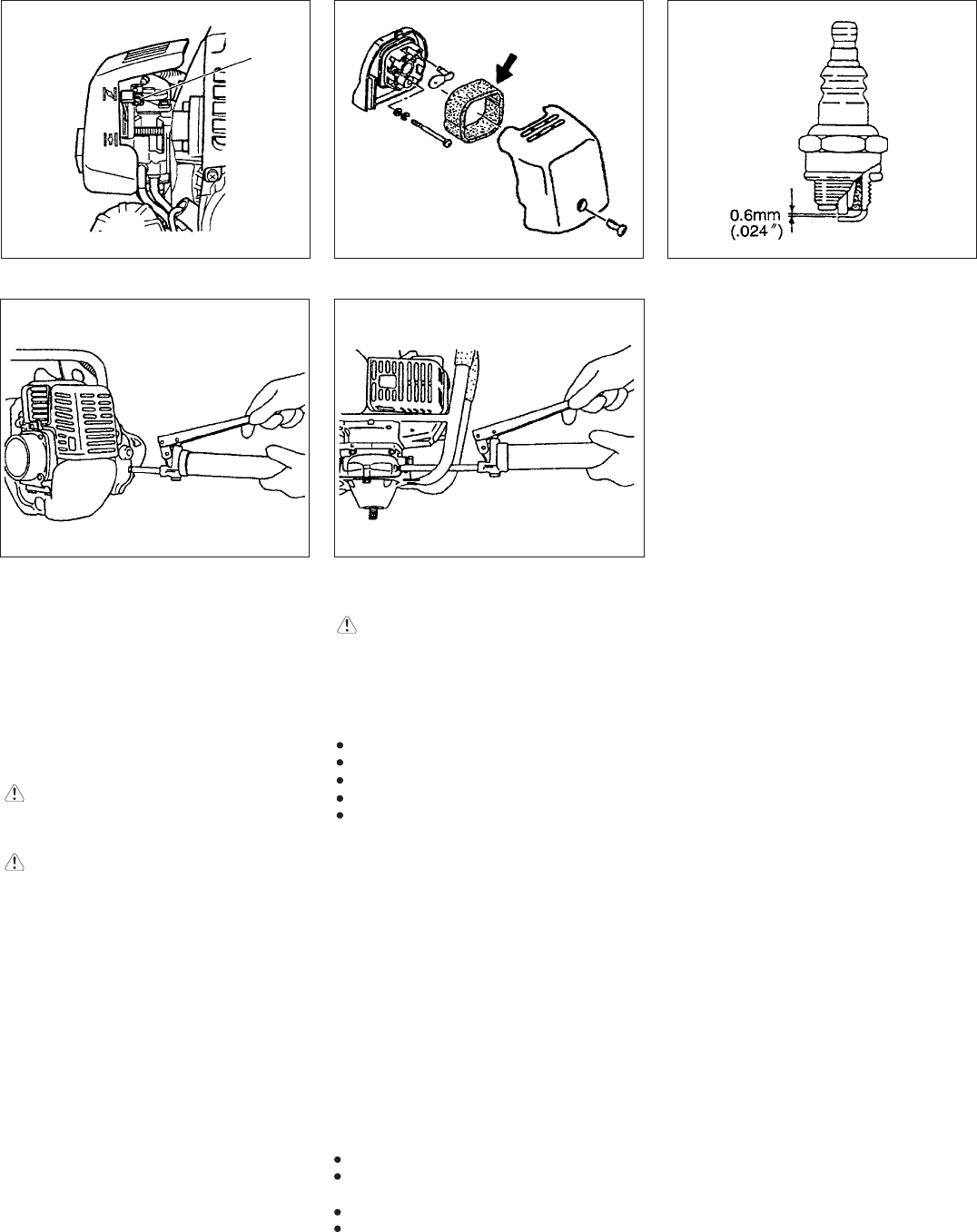
TED-270
GB-10
Fig. 3-3
Fig. 3-4BFig. 3-4
5. Maintenance
MAINTENANCE. REPLACEMENT, OR RE-
PAIR OF THE EMISSION CONTROL DE-
VICES AND SYSTEM MAY BE PERFORMED
BY ANY NONROAD ENGINE REPAIR ES-
TABLISHMENT OR INDIVIDUAL.
Carburetor adjustment (Fig. 3-1)
WARNING!
The bit may be spinning during carburetor
adjustments.
WARNING!
Never start the engine without the complete
clutch cover and gear case assembled!
Otherwise the clutch can come loose and
cause personal injuries.
In the carburetor, fuel is mixed with air. When
the engine is test run at the factory, the
carburetor is adjusted. A further adjustment may
be required, according to climate and altitude.
The carburetor has one adjustment possibility:
T = Idle speed adjustment screw.
Idle speed adjustment (T)
Check that the air filter is clean. When the idle
speed is correct, the bit will not rotate. If
adjustment is required, close (clockwise) the T-
screw, with the engine running, until the bit
starts to rotate. Open (counter-clockwise) the
screw until the bit stops. You have reached the
correct idle speed when the engine runs
smoothly in all positions well below the rpm
when the bit starts to rotate.
If the bit still rotates after idle speed adjustment,
contact Tanaka dealer.
WARNING!
When the engine is idling the bit must under
no circumstances rotate.
Air filter (Fig. 3-2)
The air filter must be cleaned from dust and dirt
in order to avoid:
Carburetor malfunctions.
Starting problems.
Engine power reduction.
Unnecessary wear on the engine parts.
Abnormal fuel consumption.
Clean the air filter daily or more often if working
in exceptionally dusty areas.
Cleaning the air filter
Remove the air filter cover and the filter. Rinse
it in warm soap suds. Check that the filter is dry
before reassembly. An air filter that has been
used for some time cannot be cleaned com-
pletely. Therefore. it must regularly be replaced
by a new one. A damaged filter must always be
replaced.
NOTE!
Saturate the element in 2 cycle oil or the
equivalent. Squeeze the element to distribute
the oil completely and to remove any excess oil.
Spark plug (Fig. 3-3)
The spark plug condition is influenced by:
An incorrect carburetor setting.
Wrong fuel mixture (too much oil in the
gasoline)
A dirty air filter.
Hard running conditions (such as cold
weather).
These factors cause deposits on the spark plug
electrodes, which may result in malfunction and
starting difficulties. If the engine is low on
power, difficult to start or runs poorly at idling
speed, always check the spark plug first. If the
spark plug is dirty, clean it and check the
electrode gap. Readjust if necessary. The
correct gap is 0.6 mm (.024"). The spark plug
should be replaced after about 100 operation
hours or earlier if the electrodes are badly
eroded.
NOTE!
In some areas, local law requires using a
resistor spark plug to suppress ignition signals.
If this machine was originally equipped with
resistor spark plug, use same type of spark plug
for replacement.
Gear case (Fig. 3-4, 4B)
Apply a good quality lithium based grease
through the grease fitting. Lubrication should be
applied at 50 hour intervals and more frequent
at heavy use.
Fig. 3-1
Fig. 3-2
T


















